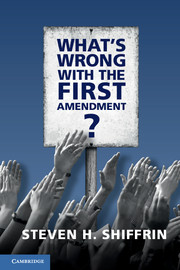5 - Violence
from PART I
Published online by Cambridge University Press: 05 September 2016
Summary
Pornography is not the only form of entertainment involving violence or depictions of violence. Pornography is part of a larger entertainment industry that includes some forms of violence or depictions of violence that deserve no constitutional protection. Indeed, I count their protection as exhibit A in support of the contention that the United States has succumbed to an indefensible form of First Amendment idolatry. In particular, I have in mind the depictions of actual animal cruelty for the entertainment of consumers and the sale of gruesomely violent video games to children. These forms of entertainment are harmful in their creation (or lead to harm), are themselves morally dubious, and are bereft of redeeming value. Despite this, the Supreme Court treats these forms of entertainment as valuable speech, speech that cannot be regulated without meeting extremely demanding requirements.
Turning first to depictions of animal cruelty, the federal statute prohibiting the depiction of animal cruelty for entertainment purposes is based on the moral view that it is wrong to treat animals in an inhumane way, and it is wrong to market displays of their suffering for commercial gain. The United States has much to be ashamed of with regard to its treatment of animals. It permits unspeakable cruelty in the treatment of and slaughtering of animals for food. The consumption of animals treated in this way raises serious moral issues (indeed, many argue that the consumption of animals itself raises serious issues apart from cruelty in their treatment). Many consume meat despite knowledge of the horrible ways in which they have been treated. Regardless of the morality of that consumption, it strikes me that those who buy video tapes of animal cruelty precisely because they enjoy witnessing the torture of animals are sick, sadistic (or masochistic), and twisted.
Immanuel Kant once argued that the immorality of animal cruelty was not based on the suffering of animals, but on the brutalization of human beings. Kant thought we owed no direct duties to animals because they lacked human dignity. This strikes me as a morally impoverished view. But Kant was right to argue that human participation in cruelty to animals is brutalizing and inconsistent with human dignity. In addition to the needless harm to innocent animals, the commercialization of the depictions of animal cruelty appeals to the baser side of human beings, a side inconsistent with their dignity.
- Type
- Chapter
- Information
- What's Wrong with the First Amendment , pp. 62 - 78Publisher: Cambridge University PressPrint publication year: 2016

